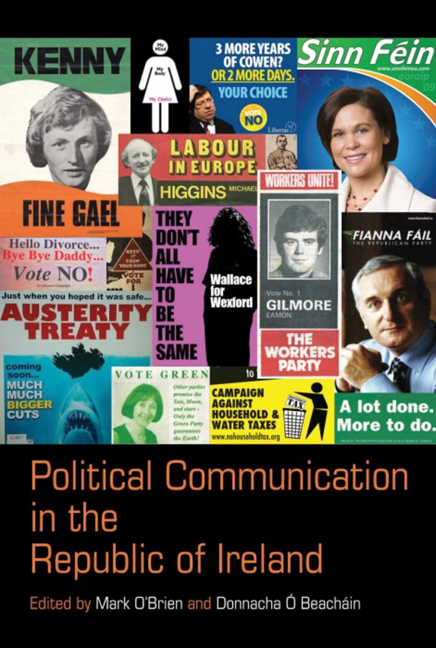Book contents
- Frontmatter
- Contents
- List of Illustrations
- Glossary
- Notes on Contributors
- Acknowledgements
- Introduction
- Part One Political Communication and Politicians
- Part Two Political Communication and Journalism
- 5 ‘Sources say …’: political journalism since 1921
- 6 In sickness and in health: politics, spin, and the media
- 7 Media advisers and programme managers
- 8 A limited focus? Journalism, politics, and the Celtic Tiger
- Part Three Political Communication and the Public
- Conclusion
- Index
5 - ‘Sources say …’: political journalism since 1921
from Part Two - Political Communication and Journalism
- Frontmatter
- Contents
- List of Illustrations
- Glossary
- Notes on Contributors
- Acknowledgements
- Introduction
- Part One Political Communication and Politicians
- Part Two Political Communication and Journalism
- 5 ‘Sources say …’: political journalism since 1921
- 6 In sickness and in health: politics, spin, and the media
- 7 Media advisers and programme managers
- 8 A limited focus? Journalism, politics, and the Celtic Tiger
- Part Three Political Communication and the Public
- Conclusion
- Index
Summary
While political journalism plays a central role in the political process it remains a hugely under-researched area of enquiry in Ireland. This is regrettable as political journalism holds those whom we elect to public account, it offers insights into the workings of political parties and governments, it is often the first draft of political history, and, occasionally it makes or breaks political careers. Taking the long view, this chapter presents a snapshot of how political journalism has evolved over the course of the last 90 years or so. Using digital newspaper archives it sheds some light on political journalism and political journalists in the early years of the state. Through interviews it examines the role that television played in transforming political journalism from passive reporting to critical analysis and commentary. Finally, amid a rapidly changing media environment, it examines the factors that impact on political journalism today.
A new state, a new parliament, 1919–61
When Dáil Éireann was established in 1919 it fell to a journalist, Piaras Béaslaí, to propose the adoption of the proclamation of independence. Béaslaí, who had worked on the Freeman's Journal and been imprisoned for his part in the 1916 Rising, was one of a number of journalists who combined newspaper work with republican activities. At the Irish Independent, reporters Michael Knightly and Hugh Smith had been active during the Rising and, along with Ned Lawlor and Paddy Quinn, reported the bitter and divisive Treaty Debates in December 1920 and January 1921 (Smyllie, 1948). Hugh Curran reported on these debates for the Irish Times and some months later, that paper's future editor, Robert Smyllie, first encountered Michael Collins. While Smyllie had expected ‘a sinister, beetle-browed, scowling kind of anarchist, who would cut your throat as soon as he would look at you’ he found Collins to be ‘a big, jovial, open-faced young man with a great shock of black hair and a wide grin that explained to me, at any rate, the astonishing hold that he had on his followers’ (Smyllie, 1948). The establishment of a new parliament and its move to Leinster House in 1922 entailed a process of negotiation regarding the facilities afforded to journalists. In June 1923 the political correspondents walked out of the Dáil halfway through a debate in protest at the lack of facilities provided for them.
- Type
- Chapter
- Information
- Political Communication in the Republic of Ireland , pp. 79 - 96Publisher: Liverpool University PressPrint publication year: 2014



